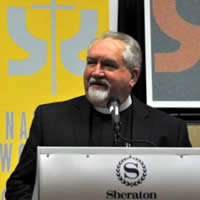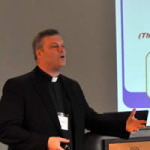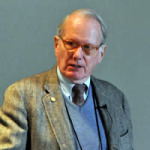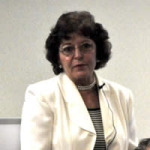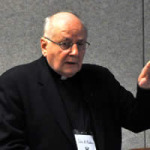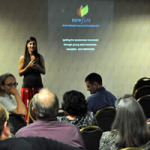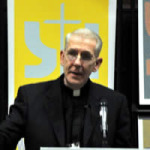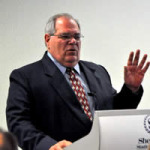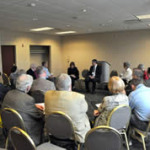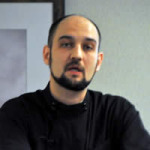Together with Glad and Generous Hearts || May 9-12, 2011 – Pittsburgh, Pennsylvania
Documents
Seminars
- Ecumenism and Interreligious Affairs
Fr. Leo Walsh (Catholic)
Congratulations! Your diocese, synod or presbytery has just appointed you Ecumenical/ Interreligious Officer and sent you to the National Workshop! What are you going to do now?! This seminar was a fast-paced, informative exploration of the basics that you will need to know to be effective in your new position. Topics include – Why Every Christian Should Be Involved; a Five-minute History of the Modern Ecumenical Movement; the WCC and Vatican II Watershed of the ‘60’s; The “How to” of Ecumenism; Present Theological and Practical Issues; and the basics of Interreligious Dialogue. This seminar was intended primarily for those who are just beginning their ecumenical and Interreligious ministry.
- Ecumenical Consultation on Ethical Decisions
Br. Jeffrey Gros (Catholic)
Ethical and moral issues are challenges to ecumenical relationship. How should there be Ecumenical consultation as a church body is considering a decision on moral or ethical issues? The presenter provided a framework for approaching ethical and moral concerns from his theological, ecclesiological and ecumenical perspective.
- Spiritual Ecumenism
Susan Muto, Ph.D (Catholic)
Spiritual Ecumenism is grounded in prayer and focused on God’s presence in our world and in the unity we share in Christ. Deeper prayer and spiritual discernment in our work together as followers of Jesus is an integral part of our common journey in mission and work to manifest the unity given in Christ. This seminar provided practical guidance in implementing and strengthening spiritual Ecumenism – and that unity which finds expression in actions which express and build up our unity in Christ and with one another.
- Harvesting the Fruits
Rev. Msgr. Dr. John Radano (Catholic)
Focused on Cardinal Kasper’s Harvesting the Fruits: Basic Aspects of Christian Faith in Ecumenical Dialogue (2009) which explores the 39 reports produced, altogether, by the first four international bilateral dialogues involving the Catholic Church starting after Vatican II, and continuing until now; with the Lutheran World Federation, the World Methodist Council, the Anglican Communion, and the World Alliance of Reformed Churches. Each bilateral is significant and the study of the reports of any one would show how two communions are beginning to resolve long standing differences. But this project looks across all four together, trying to harvest levels of consensus/convergence achieved regarding four major areas: (1) fundamentals of common faith: Jesus Christ and the Trinity, (2) salvation, justification, sanctification, (3) the Church, (4) sacraments of baptism and Eucharist. Is there an emerging shared consensus/convergence among five Christian communions on these vital themes? If so, what are the implications for our ecumenical journey?
- New Fire– Intergenerational Ecumenism
Jordan Blevins, NewFire Co-Moderator
Robyn Fickes, NewFire Co-Chaplain
The NewFire network continues to build momentum, and add to the depth and diversity of participation of young adults with hearts for who the church is and what the church does. In a time of life transition, NewFire brings together young adult leaders from Catholic to Pentecostal, Orthodox to Brethren. NewFire continues to engage the world, hosting film screenings on young adult activism and race relations during Apartheid in South Africa, hosting a 3rd national gathering discussions hosted by the NCC, and sponsoring seed grants for local young adult led ecumenical events nationwide. Building bridges between young adults with their home communions, NewFire expands our work in the Body of Christ by partnering with an ever-growing number of young adult engaged organizations. Join members of the NewFire Task Force to learn more about the spirit and content of this work, and how you and others in your communities can get involved.
- A Tale of Two Pontiffs: Ecumenical and Interreligious
Fr. Dennis McManus, Ph.D (Catholic)
What’s the difference between recent Popes? This seminar provided an overview of the ecumenical and interreligious policies of Popes John Paul II and Benedict XVI. It will examine the backgrounds – cultural, personal, theological – of each Pope and their developed thinking on how the Catholic Church can approach the stablishment of good relations and the construction of dialogues with other religious communities. Attention was given to present conflicts and likely outcomes and updates on current issues before the U.S. Conference of Catholic Bishops.
- Global Christianity
Fr. George Worgul (Catholic)
As Christian churches in the Northern Hemisphere are declining, the churches in the Southern Hemisphere are growing rapidly. Pentecostals and Evangelicals compete with established Christian traditions. New believers live alongside Muslim neighbors. The presenter shared his knowledge of Christianity in the global context, especially from his efforts to establish partnership in higher education in West Africa with Duquesne University.
- The Church and The Holocaust
Rabbi James Gibson (Reform)
Rev. Cynthia Bronson-Sweigert (TEC)
What was the churches’ role in the Holocaust? What are we teaching our seminarians and congregants about the Holocaust? Should Yom Hoshoah and Kristallnacht be commemorated by Christians? The presenters shared their experiences as partners in interfaith dialogue, social justice and service.
- Orthodox Spirituality
Fr. Bogdan Bucur (Orthodox)
The study of apocalyptic literature, of the Qumran Scrolls, and of later Jewish mysticism throws new and welcome light on the synthesis of doctrine, liturgical practices, and ascetico-mystical theories commonly referred to as “the spirituality of the Christian East.” This seminar explored specific points of continuity and discontinuity between Second Temple apocalypticism and Orthodox Christian spirituality: the notion of “open heavens” offering direct access to heavenly mysteries; the mirroring and interdependence between corporate liturgical experience, experience of the individual inner life, and the experience of celestial realities; the central importance given to biblical theophanies as entrypoint into both reading the Scriptures and personal mystical experience; finally, the language of “ascent,” “heavenly liturgy,” “glorification,” and “transformation” used to convey claims to extraordinary experience .
Highlights

Monday, May 9th
On Monday, May 9th, attendees began the process of registering for the National Workshop on Christian Unity and for their Denominational Network meeting as appropriate. At the same time, a number of network related meetings and seminars began to take place.
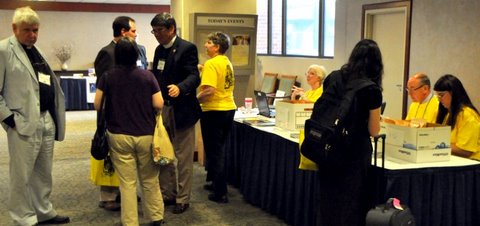
Newcomers gathered after lunch for the Orientation for Newcomers, again led, this year, by Sister Lorelei Fuchs and Canon Daniell Hamby.
It was quickly evident that the local planning committee, under the leadership of the Rev. Dr. Donald Green, Executive Director of Christian Associates of Pittsburgh, had done an outstanding job of preparing to host us for this National workshop, in Pittsburgh. The registration process went smoothly, and everything was quickly falling into place.
The Opening Prayer Service
The opening worship service was held in the historic Smithfield United Church of Christ. Taking part in the leadership of the service were Bishops and Governing Body Executives form our major participating denominations, which included a wide representation of eastern rite church leaders. Choirs from the St. Andrew’s Episcopal Church, St. Georges Orthodox Cathedral, Greater Allen AMC Church and the First Lutheran Church added to the richness of the service (as attendees arrived they were serenaded by the Salivation Army Band on the sidewalk outside the church).
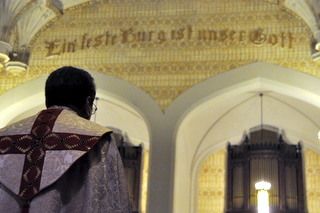
The evening’s sermon was delivered by Bishop Donald McCoid. Bishop McCoid serves as Executive for Ecumenical and Inter-Religious Relations of the Evangelical Lutheran Church in America. He is Bishop Emeritus, Southwestern Pennsylvania Synod. In the photo on the left,Lutheran Bishop Donald McCoid facing words (in German) to Martin Luther’s hymn, A Mighty Fortress is Our God In his sermon he lifted up the words of Pope Benedict, who reminded us that the search for Christian Unity is not an option to be pursued, but is an imperative what we must together work toward.
Following the reception, seen in the photo below, worshippers enjoyed an abundant reception that included many regional favorites, including rosemary honey corn bread bits; mashed potato bar with toppings; pulled pork sliders with apple cole slaw; cheese and fruit, artichoke dip with pita chips. Having indulged in that reception, many attendees welcomed the opportunity to walk off the food by returning to the hotel, on foot.

Tuesday, May 10
The Graymoor Breakfast
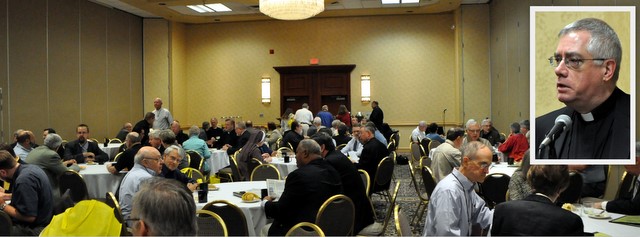
Once again, the Graymoor Ecumenical and Interreligious Institute sponsored a breakfast for NWCU attendees. The Graymoor order Fathers and Sisters of the Atonement) was represented by Father James Loughran (inset photo on the right). The breakfast was well attended and it provided for a time of rich table fellowship..
The 2011 NWCU Keynote Address || Full Text
Sponsored by the Military and Hospitaller Order of Saint Lazarus of Jerusalem
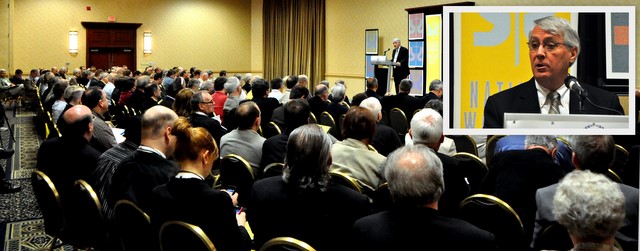
The Keynote Address for this year’s Workshop was given by the Rev. Dr. Robert Welsh. Dr. Welsh is the president of the Council on Christian Unity since January 1, 1999. He is a minister in the Reformed Church of America. Dr. Welsh has been a frequent participant and presenter at the National Workshop on Christian Unity.
In his address he cited the necessity of our Harvesting the Fruit of our Ecumenical Dialogues, making the Dialogue conclusions real. He asked us how are the thousands of Pages of agreements to be made visible. He asserted that this can only be done in dialogue with the world religions.
He also addressed the need to discover a common Christian Voice in dialogue with the world religions. He challenged us to reach out to the Pentecostal and Evangelical brothers and sisters, both globally and in our local communities.
We must also recapture a sense of the Scandal of Divisions and make public confession of our sin.
Ecumenical Eucharistic Service, Presbyterian Rite
On Tuesday evening, a Eucharistic Communion Service was held for Episcopal, Lutheran,Presbyterian (and other Reformed Bodies), and United Methodist Workshop attendees. Each year the rite of a different Communion us used for the service. This year was the year to observe and participant in the rite of the Presbyterian Church,USA. The service was held in the sanctuary of Pittsburgh’s First Presbyterian Church.
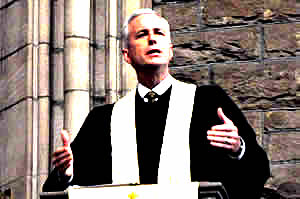
The preacher for the evening was the Rev. Dr. Craig Barnes, Pastor and Head of Staff at the Shadyside Presbyterian Church and Robert Mcneilly Professor of Leadership and Ministry at Pittsburgh Theological Seminary.
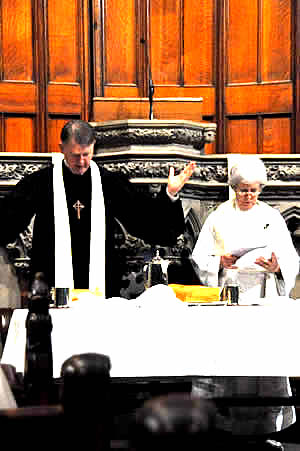
The Eucharistic celebrants were the Rev. Dr. Sheldon Sorge, Pastor to Presbytery, Pittsburgh Presbytery and the Rev. Dr. Carolyn Jones, Retired executive of Washington Presbytery and former Executive of the Synod of the Covenant.
Parakles (Ukrainian Rite Vespers) Service
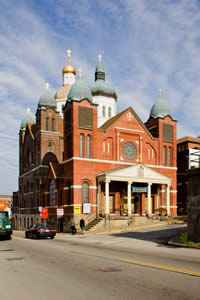
While the above Ecumenical Eucharistic Service was occurring, many of the Workshop participants participated in an Eastern Rite Parakles service at St. John the Baptist Ukrainian Catholic Church .
Read Pastor Repp’s commentary on the Ukranian Rite Vespers Service, which appeared in the June 2011 issue of LERNing, edited by Pastor Kim Rapczak.
Wednesday, May 11
National Council of Churches Breakfast
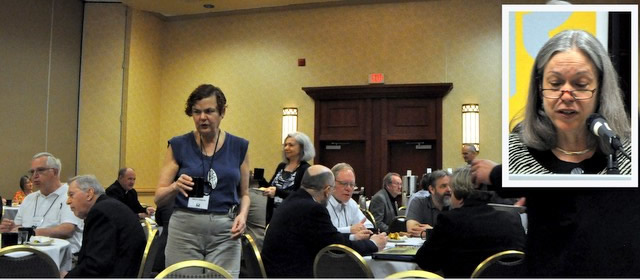
Once more, our day began with a breakfast, this one hosted by the National Council of Churches. As the attendees enjoyed breakfast and shared in fellowship around the tables, Dr. Clare Chapman, Deputy General Secretary of the NCCC, introduced several officers and staff members who shared with the group information related to their areas of ministry.
Interactive Plenary on Racism
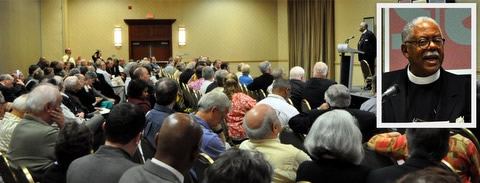
Before lunch, attendees took part in the third of what is to be four annual opportunities to address the issue of Racism and its impact upon Ecumenism Our plenary speaker was The Rev. Harold T. Lewis has been the Rev. Canon Harold T. Lewis, rector of Calvary Episcopal Church, Pittsburgh, Pennsylvania, since 1996. Since his ordination in 1971, he has served congregations in Honduras, England, Washington, DC, New Haven, CT and his native Brooklyn, NY. From 1983 until 1994, he served on the staff of the Presiding Bishop of the Episcopal Church as Director of the Office of Black Ministries.
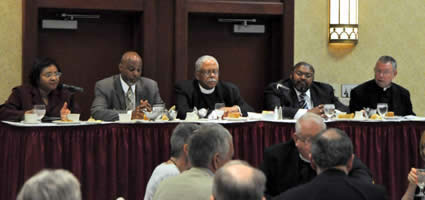
After presenting his address on Racism and Ecumenism, Cannon Lewis responded to question from attendees.
The attendees then moved from the plenary room to the dining room where they reflected upon the words of Canon Lewis. They then heard responses to the presentation of Racism, by three other black leaders.
Wednesday Afternoon – Network Seminars
Monday after noon was a time for the major networks to conduct seminars that were not only open to their own members, but where members of other networks (and persons not part of any network) were free to attend. So, a member of LERN (the Lutheran network) might choose to attend a CADEIO (the Catholic network) workshop, because the topic is of interest to that person. Or a member of the American Baptist Church might be interested in a workshop topic being explored by EDEIO (the Episcopal Network)
Gateway Clipper Dinner Cruise
Wednesday evening the workshop took time to relax, have fun, and to build relationships with one another. We had a riverboat chartered just for our group. The two and one half our cruise, included a buffet dinner of traditional Pittsburgh ethnic dishes, and a feature unique to the Pittsburgh region, a Wedding Cookie Table. At most Pittsburgh weddings, tables are stacked with home made cookies, and guests take home a dozen or more cookies from the wedding. Such a table was set up for the dinner cruise participants. They had been made by church members in the Pittsburgh host city.
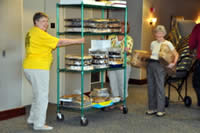
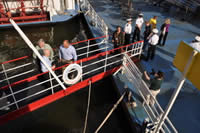
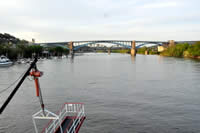
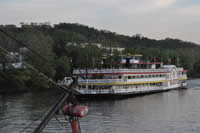
Thursday, May 12
NWCU Bible Study Plenary Session
Sponsored by the American Bible Society

Sponsored by the American Bible Society
This years NWCU Bible Study was led by Dr. Mark Allan Powell, professor of New Testament at Trinity Lutheran Seminary. Dr. Powell explored the meaning of the theme text for the Workshop (Acts 2:46 – Every day they continued to meet together in the temple courts. They broke bread in their homes and ate together with glad and sincere hearts) . Dr. Powell’s presentation engaged the participants, and resulted in an interactive process that was highly effective.
Participants Adopt Statement: Christian Unity is Our Calling || Full Text
In response to the Challenge presented by Keynoter, Robert Welsh, the gathered participants adopted a statement entitled, Christian Unity is Our Calling. That statement had been drafted by a team made up of representatives of the Denominational Networks and several members of the National Planning Committee.
Closing Address by Br. Jeffrey Gros, FSC || Full Text
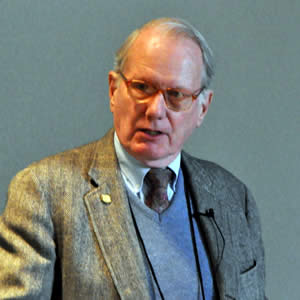
The final Workshop plenary session took place prior to the Closing Luncheon. For this event, the workshop had the opportunity to hear an address by Brother Jeffrey Gros. Jeff Gros has a distinguished career and an Ecumenist and as an educator. For a decade, he served as Director of Faith and Order for the National Council of Churches. Then for 14 years he served as Associate Director of the Secretariat for Ecumenical and Interreligious Affairs at the United States Conference of Catholic Bishops. Brother Gros is currently distinguished professor of Ecumenism and Historical Theology at Memphis Theological Seminary, and Academic Dean on the Institute for Catholic Ecumenical Leadership.
Dr. Gros challenged us, using the theme text, “One in the Apostles’ Teaching, Fellowship, Breaking of Bread and Prayer.”
“Hats Off” to Pittsburgh Local Planning Committee – Well Done
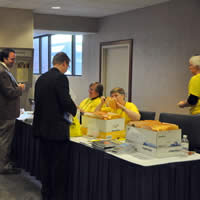
A special thanks to members of the Pittsburgh Local Planning Committee, to and to the many volunteers who worked so very hard to make this year’s National Workshop a success. Among those who played key roles were their chair, Donald Greene (photo on right) and Tracie Richie of Christian Associates, Registrar Pam Block and Treasurer Joe Luttringer. From those who welcomed us at registrations, to the people who baked the thousands of cookies given out on the Gateway Clipper Cruise, we say, “Hats Off & Thanks.”
